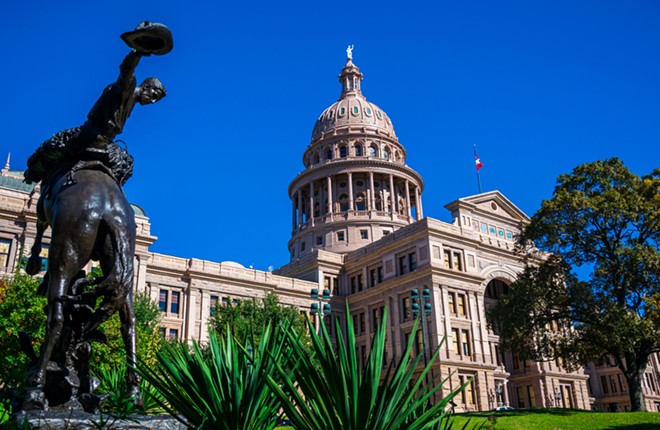
Last week, the Texas Nationalist Movement (TNM) went into a social media meltdown after the Republican Party of Texas refused to allow a question about Texas seceding from the United States onto the party's 2024 primary ballot.
In an open letter to the TNM, the Republican Party of Texas argued that the group didn't deliver its petition to include the question by the Dec. 11 deadline and that only print signatures on such a petition are valid.
In response, TNM and its leader, Daniel Miller, threatened to sue. After all, the "TEXIT" movement did gather 100,000 electronic signatures to be considered on the ballot.
Despite the drama, observers shouldn't be surprised by Texas GOP's decision to keep the question off the ballot.
"The Republican Party of Texas doesn't want to offer the opportunity for its primary electorate to express silliness," said Southern Methodist University political scientist Cal Jillson. "It would simply draw them into defending something that is not currently defensible and is not a real thing. It's simply not the case under current law and the constitutional interpretation of the country [that Texas could secede]."
Despite Jillson's insistence that legal barriers prevent the rise of a Second Republic of Texas, fringe ideologues continue to waste time and valuable air pushing for that impossible agenda.
Can Texas Secede?
The idea of an independent Texas stems from the Lone Star State's brief history as an independent nation. It lasted from 1836 to 1846, following Texas' war of independence from Mexico.
Despite the Republic of Texas being an impoverished land with a bankrupt government, the romanticism of the period never seemed to fade, Jillson said.
Following the end of the Civil War, Union troops occupied the rebellious southern states during Reconstruction. When Texas rejoined the Union in 1870, one of the provisions was that the state would forswear the idea of ever seceding again.
The U.S. Supreme Court's ruling in 1869's Texas v. White case further solidified the bond between the Lone Star State and the rest of the nation.
"What Chief Justice [Salmon P.] Chase said is that states cannot decide to leave the union through referendum," Jillson said. "The last part of what Chief Justice Chase wrote in his opinion is that states can attempt to extricate themselves through revolution. But he's essentially saying, 'You guys just tried that, and you got crushed. So if you want to do that again, that's your only way out.'"
Indeed, the only way out of the Union, per the high court's opinion, is via violent revolution — or if all the other states agreed unanimously that Texas could leave.
"I've always joked that if Texas were to do that, the other 49 would say, 'Yeah, don't let the door
hit you in the ass,'" Jillson quipped.
The Supreme Court
A popular talking point of the TNM — one prominently displayed on the group's homepage FAQ — is that despite the Texas v. White ruling, the question of secession isn't explicitly mentioned in the U.S. Constitution. What's more, Supreme Court rulings can be overturned, as recently illustrated by the 2022 decision overturning Roe v. Wade.
"To say that it's not in the Constitution, to say it's just a Supreme Court decision, is meaningless," Jillson countered. "An extraordinary amount of our modern understanding of the Constitution is not explicitly in the document. It is in the document as interpreted by the United States Supreme Court over the course of the last 140 years."
Even if the TNM did manage to prompt the nation's highest court to weigh in, the justices would have little to no incentive to allow Texas, the second-largest state economy, to jump ship.
"I think the serious answer is that the Supreme Court, like the Supreme Court of 1869, has a desire for constitutional stability and for national integrity to be maintained," Jillson said. "And so the idea that California might get disgusted with a second Trump term and decide to leave, or a second Biden term will cause Texas to leave, is simply untenable for a nation with the kinds of responsibilities and opportunities that the United States has, both domestically and around the world."
The Second Republic of Texas
With the U.S. Supreme Court unlikely to budge, the only other way out is a second Texas revolution that would be fought against the world's most powerful and well-funded military. Even though 46% of Texans own guns, according to the Texas Tribune, it seems unlikely that would be enough firepower to get the job done.
But, even if the second coming of Sam Houston successfully rids Texas of American forces, what would the Second Republic of Texas look like?
For one, it would be a lot poorer than it is now.
"The median income in Texas is already below the national average, and so that would decline further," Jillson said. "Texas underfunds its public schools, and presumably, if it didn't have to comply with federal regulations, it might underfund them even more. So, Texas would be a poorer nation and would trend poorer than wealthier as a result of its departure from the Union."
Indeed, an independent Texas would lose access to the largest free trade market in the world and also sacrifice billions of dollars in federal funding received for things like infrastructure, education and hosting military bases, the professor added.
All of that lost revenue would have to be made up somehow — most likely through (gasp) an income tax.
In other words, Texas isn't likely to become an independent nation.
"Now, that doesn't mean that people with a lot of time on their hands and little else productive to do still talk about it," Jillson said. "But it doesn't mean that it's a real thing the rest of us who have actual lives need to pause and think about."
Subscribe to SA Current newsletters.
Follow us: Apple News | Google News | NewsBreak | Reddit | Instagram | Facebook | Twitter| Or sign up for our RSS Feed

















